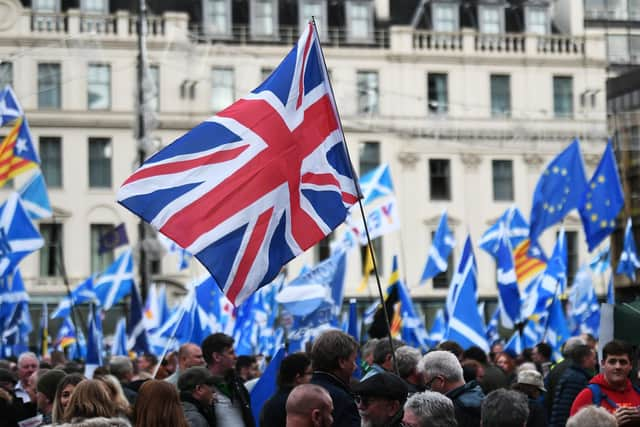Half of Scots believe independence and Brexit division will last generation, finds poll
Former prime minister Gordon Brown will today warn that Scotland risks becoming “one of the West’s most divided countries”, after the survey also found 57 per cent of people say the country is divided.
Of these, nearly half fear the divisions left by the independence and Brexit battles will last a generation and may never be healed, according to the YouGov survey of 2,500 Scots.
Advertisement
Hide AdAdvertisement
Hide AdAlmost half of Scots now have less trust in politicians and a third said they are less likely to discuss politics with casual acquaintances, the poll commissioned by the Our Scottish Future think tank found. The ex-Labour leader will address the These Islands conference in Newcastle today, saying that divisions can only be healed by listening to demands for change.


“The poll shows Scotland is at risk of becoming one of the West’s most divided countries and stuck in a rut,” he said. “I want us to break out of the trench warfare from which everyone loses out. We are divided because we have been polarised by extreme positions – either a no-change, status quo ‘do nothing’ stance or an ever harder separation, including now abandoning the UK pound.
“The poll shows that Scotland is not just more divided than at any time in my lifetime but these divisions could dominate our lives for many decades to come.”
The poll sets out the impact which political division has had on communities across Scotland.
Only a quarter of people who felt the country was divided said it had not had a damaging impact on their lives.
Division
By contrast, 44 per cent said that divisions attributed to Brexit and independence had eroded trust in Scotland’s political system, and more than a third (34 per cent) agreed that the divisions made it less likely they would discuss politics with casual acquaintances.
A further 8 per cent said they have fallen out with close friends and family as a result of the divisions.
Only 2 per cent agreed with the statement that the divisions would be overcome within the next year.
Advertisement
Hide AdAdvertisement
Hide AdHalf of Scots (50 per cent) blame the SNP for the divisions, according to the findings. The prospect of a second referendum is blamed by 41 per cent of respondents, while 26 per cent say everyone bears some responsibility.
The Brexit process has been particularly contentious in Scotland as a majority of Scots voted to Remain in the EU, but the weight of votes south of the Border swung the outcome in favour of Leave. Since then, the SNP has used the outcome to push for a second referendum on independence, claiming the security of EU membership was at the heart of the pro-union campaign in 2014.
Recent polling has suggested a narrow majority of Scots are now in favour of independence although the country is largely split down the middle.
'Cosmetic gestures'
Mr Brown also criticised Prime Minister Boris Johnson for offering nothing other than “cosmetic gestures” to the devolved administrations.
“Scotland looks more like two nations, not the united country I’d like it to be,” he said.
“Divisions over independence and over a referendum are now spilling over into other areas – the future of the pound, the future of Scotland’s relations with Europe, the priorities we give to health, education and high-quality jobs and the environment.
“Nor is there any sign that existing policies can break the Scottish deadlock. Boris Johnson is not offering any new ideas to Scotland and the regions other than the current cosmetic gestures.
“This Punch and Judy cycle – both sides dug in with all-or-nothing stances – has got to give way to common sense answers. I want to end the divisions with a plan to bring us back together again.”
Advertisement
Hide AdAdvertisement
Hide AdThe former prime minister also outlined proposals tfor a series of “Neighbourhood Assemblies” across Scotland in the spring, with an aim to find common ground between Scots from all political backgrounds and none.
He said: “With our Neighbourhood Assemblies, we will investigate over the next few months whether the divisions are so entrenched that nothing can be done or whether, as I hope, we can find some common ground.
“So we have to listen and be prepared to rethink our view of what the UK is, the shape it takes, what binds us together, or many people fear the UK will collapse in this century just as surely as the British Empire collapsed in the last.
“We need not only to listen and learn, but then have the courage to change and reform. It’s time to do something radically different – work together, not pull apart.”
But SNP deputy leader Keith Brown pointed to another YouGov poll last month which showed that 53 per cent of Scots do not trust Mr Brown’s statement on Scotland’s future, while 28 per cent do.
“The people of Scotland don’t trust a word Gordon Brown says on Scotland’s future – and it’s no wonder, when he would opt for the Tories’ Brexit shambles instead of independence,” he said.
“Mr Brown should be supporting the people of Scotland’s democratic right to choose their own future, instead of siding with Boris Johnson. Independence will allow us to protect our vital national interests and create a fairer, more prosperous country – instead of having policies imposed on us by a right-wing Tory government.”